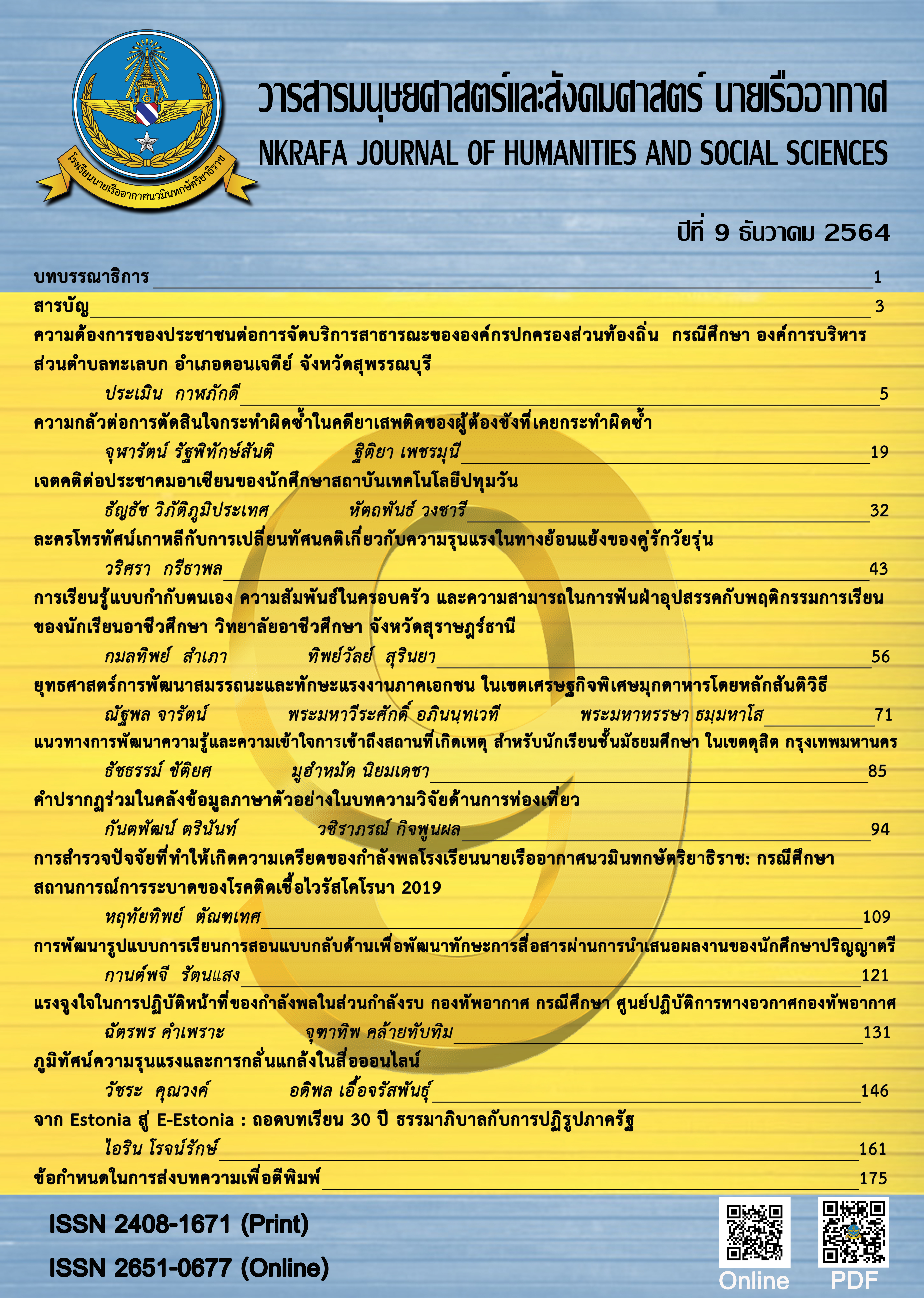The Development Strategy of Labour Competencies and Skills for the Private Sectors in Mukdahan SEZ by Peaceful Means
Main Article Content
Abstract
The aims of this research were 1) study the context of the development of labour competencies and skills for the private sectors in Mukdahan SEZ including to its problems, causes and crises, 2) apply Shanti Dhamma doctrine that has been discovered in the royal literary work; the story of Mahajanaka by HM the Late King Bhumibol Adulyadej to propose policy for the private sector labour’s Kaya and Jitta developing in Mukdahan SEZ, and 3) propose the mechanism that will able to drive the policy of the development of labour competencies and skills for the private sector in Mukdahan SEZ by peaceful means in accordance with the national strategy. This research was typically conducted by qualitative research methods with deeply documentary and fieldwork studies. Data collected by in-depth interviews with fifteen key informants consisting of ten Mukdahan SEZ entrepreneurs and business owners, three officers, one expert involved to the royal literary work and lastly one Buddhist monk. The results of the research found that 1) insufficiency of precise provincial policy in the development of labour competencies and skills for the private sectors in Mukdahan SEZ, 2) insufficiency of industrial sectors skilled and unskilled labours included to lacking the quality or quantity required, and 3) the labour is lacking a regular training to upskill to be the expert of the field. In the aspect of peace ideology that applying for this research had found in the royal literary works zoomed to Bhavana IV; the four aspects of self-development which are consisting of Physical Development, Social Development, Emotional Development, and Intellectual Development. They literally have been adopted to a new acronym that was called Mukdahan’s RESKILL; R for Resilience, E for Economic Security, S for Standards of Training, K for Kindhearted Action, I for Intellectual Property, L for Leadership and another one L for Legal Forces. The new finding found that the significant factors which are greatly impacting the results of labour development by peaceful means were Economic Security (E) and Leadership (L). Because of all mentioned above, the finding should be implemental for the Mukdahan SEZ’s policy proposal to develop the labour as local needs.
Article Details
บทความที่ได้รับการตีพิมพ์เป็นลิขสิทธิ์ของวารสารมนุษยศาสตร์และสังคมศาสตร์ นายเรืออากาศ
ข้อความที่ปรากฎในบทความแต่ละเรื่องในวารสารวิชาการเล่มนี้ เป็นความคิดเห็นส่วนตัวของผู้เขียนแต่ละท่าน ไม่เกี่ยวข้องกับโรงเรียนนายเรืออากาศฯ และคณาจารย์ท่านอื่น ๆในโรงเรียนนายเรืออากาศฯ แต่อย่างใด ความรับผิดชอบขององค์ประกอบทั้งหมดของบทความแต่ละเรื่องเป็นของผู้เขียนแต่ละท่าน หากมีความผิดพลาดใด ๆ ผู้เขียนแต่ละท่านจะรับผิดชอบบทความของตนเองแต่เพียงผู้เดียว
References
กนกวรรณ มะโนรมณ์, “เขตเศรษฐกิจพิเศษชายแดนอีสาน ภายใต้เสรีนิยมใหม่และรัฐในฐานะ “นายหน้า ที่ดิน” กรณีศึกษาเขตเศรษฐกิจพิเศษมุกดาหาร” วารสารสังคมศาสตร์และมนุษยศาสตร์, ปีที่ 45, ฉบับที่ 1, หน้า 279 - 283, 2562.
ชญานิษฐ์ แสงทิพย์ เสาวลักษณ์ โกศลกิตติอัมพร ยุภาพร ยุภาศ และสัญญา เคณาภูมิ, “สมรรถนะในการปฏิบัติงานของบุคลากรกรมพัฒนาฝีมือแรงงานในกลุ่มจังหวัดร้อยเอ็ด - ขอนแก่น - มหาสารคาม - กาฬสินธุ์” วารสาร ว.รมน. (มนุษยศาสตร์และสังคมศาสตร์), ปีที่ 8, ฉบับที่ 1, หน้า 169-180, มกราคม – เมษายน, 2557.
สถาบันคุณวุฒิวิชาชีพ, “บทสรุปสำหรับผู้บริหาร (Executive Summary Report) จากรายงานฉบับสมบูรณ์ (Final Report) โครงการประเมินผลการดำเนินงานความคุ้มค่าและมูลค่าเพิ่มทางเศรษฐกิจและสังคมจากการดำเนินงานของสถาบันคุณวุฒิวิชาชีพ (องค์การมหาชน) ในรอบระยะเวลา 5 ปี”, รายงานวิจัย สถาบันคุณวุฒิวิชาชีพ (องค์การมหาชน) สำนักนายกรัฐมนตรี, กรุงเทพฯ, 2560.
พระบาทสมเด็จพระเจ้าอยู่หัวภูมิพลอดุลยเดชฯ, พระมหาชนก, พิมพ์ครั้งที่ 3, กรุงเทพน: บริษัท อมรินทร์บุ๊ค เซ็นเตอร์ จำกัด, หน้า (8), 2541.
ฐิติพร พิพิธภักดี จุฑาทิพย์ ทับทอง วิมลพรรณ ศรีใจวงศ์ ศิริลักษณ์ ขำมี และสมศรี รังสิกรรพุม, “วิเคราะห์คุณธรรมสี่ประการ ตามพระราชดำรัสของพระบาทสมเด็จพระเจ้าอยู่หัวภูมิพลอดุลยเดชฯ จากพระราชนิพนธ์เรื่องพระมหาชนกและกลวิธีการประพันธ์”, การค้นคว้าอิสระศิลปศาสตรมหาบัณฑิต มหาวิทยาลัยนเรศวร, 2544.
สำนักงานคณะกรรมการข้าราชการพลเรือน, “หนังสือเวียนสำนักงาน ก.พ. ที่ นร 1008/ว27 ลงวันที่ 29 กันยายน 2552 เรื่อง มาตรฐานและแนวทางการกำหนดความรู้ความสามารถ และสมรรถนะที่จำเป็นสำหรับตำแหน่งข้าราชการพลเรือนสามัญ”, หน้า 6-33, กันยายน, 2552.
สัมภาษณ์ K8 (นามสมมุติ), เจ้าของกิจการ, สัมภาษณ์เมื่อ 21 กันยายน 2563.
สัมภาษณ์ K4 (นามสมมุติ), ผู้บริหารระดับสูง, สัมภาษณ์เมื่อ 23 กรกฎาคม 2563.
ณัฐพล บัวเปลี่ยนสี, “รูปแบบการพัฒนาบุคลากรในพื้นที่ระเบียงเศรษฐกิจพิเศษภาคตะวันออกเพื่อรองรับอุตสาหกรรมเป้าหมายในอนาคต” วารสารวิชาการ สถาบันเทคโนโลยีแห่งสุวรรณภูมิ (สาขามนุษยศาสตร์ และสังคมศาสตร์), ปีที่ 4, ฉบับที่ 1, หน้า 310, มกราคม - มิถุนายน, 2561.
สัมภาษณ์ K4 (นามสมมุติ), ผู้บริหารระดับสูง, สัมภาษณ์วันที่ 23 กรกฎาคม 2563.
จินุกูล หลวงอภัย, “การพัฒนาทรัพยากรมนุษย์ตามหลักภาวนาธรรมของศูนย์ฝึกอบรมตำรวจภูธรภาค ๖ จังหวัดนครสวรรค์” วารสารวิจยวิชาการ, ปีที่ 1, ฉบับที่ 2, หน้า 75-84, พฤษภาคม – สิงหาคม, 2561.
Manjeet Kharub and Rajiv Kumar Sharma, “Investigating the Role of Porter Diamon Determination for Competitiveness in MSMEs” International Journal for Quality Research, Vol. 10, No.3, pp. 471 – 486, 2016.
พระพรหมคุณาภรณ์ (ป. อ. ปยุตฺโต), บทนำสู่พุทธธรรม ชีวิตงาม สังคมดี ธรรมชาติเป็นรมณีย์, พิมพ์ครั้งที่ 2, กรุงเทพฯ: สำนักพิมพ์ผลิธัมม์, หน้า 19-30, 2559.
สัมภาษณ์ K3 (นามสมมุติ), พนักงานของรัฐ, สัมภาษณ์เมื่อ 31 กรกฎาคม 2563.
พระมหาหรรษา ธมฺมหาโส, “จากหมู่บ้านศีล 5 พัฒนาสู่การเป็นต้นแบบหมู่บ้านช่อสะอาด”. [Online]. Available: https://www. mcu.ac.th/article/detail/378 [Accessed: 10 กุมภาพันธ์ 2564].
พระพรหมบัณฑิต (ประยูร ธมฺมจิตฺโต), “ศาสนากับเป้าหมายการพัฒนาที่ยั่งยืน (SDGs)”. [Online]. Available: https://www.watprayoon.com/files/book/2562-03-18-SDG.pdf [Accessed: 10 กุมภาพันธ์ 2564].
สัมภาษณ์ K5 (นามสมมุติ), กรรมการผู้จัดการ, 5 สิงหาคม 2563.
อิงฟ้า สิงห์น้อย และรัฐชาติ ทัศนัย, “นโยบายสาธารณะ: การบริหารและการจัดการภาครัฐ” วารสารสันติศึกษา ปริทรรศ์ มจร, ปีที่ 6, ฉบับพิเศษ, หน้า 614-615, 2560.


